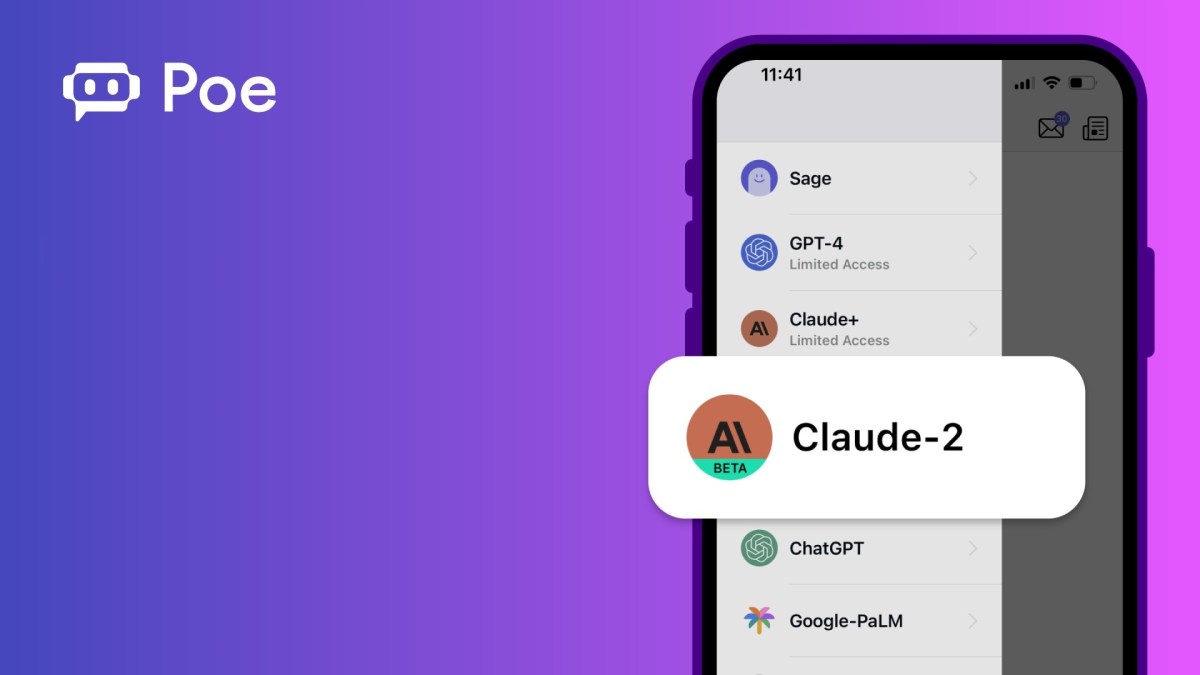When you think of the term “creator” you generally think of someone making content for social media platforms like TikTok, YouTube, or Instagram. But Quora’s AI chatbot platform Poe is now paying bot creators for their efforts, including those who generate “prompt bots” on Poe itself, as well as server bots created by developers who integrate their bots with the Poe AI.
The program, which went live last week, is among the first of its kind to monetarily reward the efforts of those building AI bots.
At launch, there are two ways for bot creators to generate income. With the first, if a bot leads a user to subscribe to Poe, the company will share a cut of the revenue back with the bot’s creator immediately. Another method involves bot creators setting a per-message fee, which Quora will pay on every message. The latter option is opening up soon, the company says.
Quora first introduced its chatbot app Poe to the general public in February, allowing users to ask questions and get answers from a range of AI chatbots, including those from ChatGPT maker OpenAI and other companies like Google-backed Anthropic. In addition to being a way for consumers to experiment with new AI technologies in one place, the company said Poe’s content would ultimately help it to evolve its Q&A site Quora. That is, if and when Poe’s content meets a high enough quality standard, it will be distributed across Quora, where it could reach the site’s 400 million monthly visitors.
Poe, meanwhile, has been gaining traction amid the growing AI chatbot market.
According to data from market intelligence provider Apptopia, Poe’s mobile app saw 253,530 downloads in its first month open to the public. As of October (through the 24th), it has seen over 18.4 million installs. In addition, the app has grown to nearly 1.22 million monthly active users. However, Apptopia estimates Poe is only generating under a quarter of a million dollars in in-app purchase revenue per month at this time. That said, many Poe users may be interacting with the chatbot platform via the web and signing up for its $19.99/month or $199.99/year subscription there instead, so this is not a comprehensive look at Poe’s numbers.
Currently, Poe’s creator monetization program is only open to U.S. users and pays up to $20 per user who subscribes to Poe thanks to a creator’s bots. There are a few ways this metric is calculated — if the creator brings a user to Poe for the first time and they eventually subscribe; if a bot brings a user back to Poe who eventually subscribes; if a bot’s paywall is seen just before the user subscribers; or soon, if users send messages to your bot at a price the developer sets. More expensive bots will be limited in terms of users sending messages to them and some bots will be subscriber-only, Quora says.
Whenever a person subscribes to Poe, the company will set aside $10 per monthly subscription or $20 per annual subscription. That amount is then split between “any monetizing creators with successfully converting activations and successfully converting paywalls for that subscription,” the company’s developer docs state. Stripe is used to process the payouts.
Quora believes this program will enable a new class of smaller companies or AI research groups to create bots that reach the public, even if they don’t have the resources to build an AI chatbot application themselves. But it also is a way for Poe to essentially pay to onboard new subscribers to its chatbot app, through something akin to an affiliate program. That could help it to better compete against a host of AI chatbot apps, many of which are already making more money on mobile devices than ChatGPT.
“We expect all kinds of bots to do well, across areas like tutoring, knowledge, therapy, entertainment, assistants, analysis, storytelling, roleplay, and image, video, music, and other media generation,” wrote Quroa CEO Adam D’Angelo in an announcement. “Since this is the beginning of a new market, there are lots of opportunities to provide a valuable service for the world and make money at the same time,” he added.

